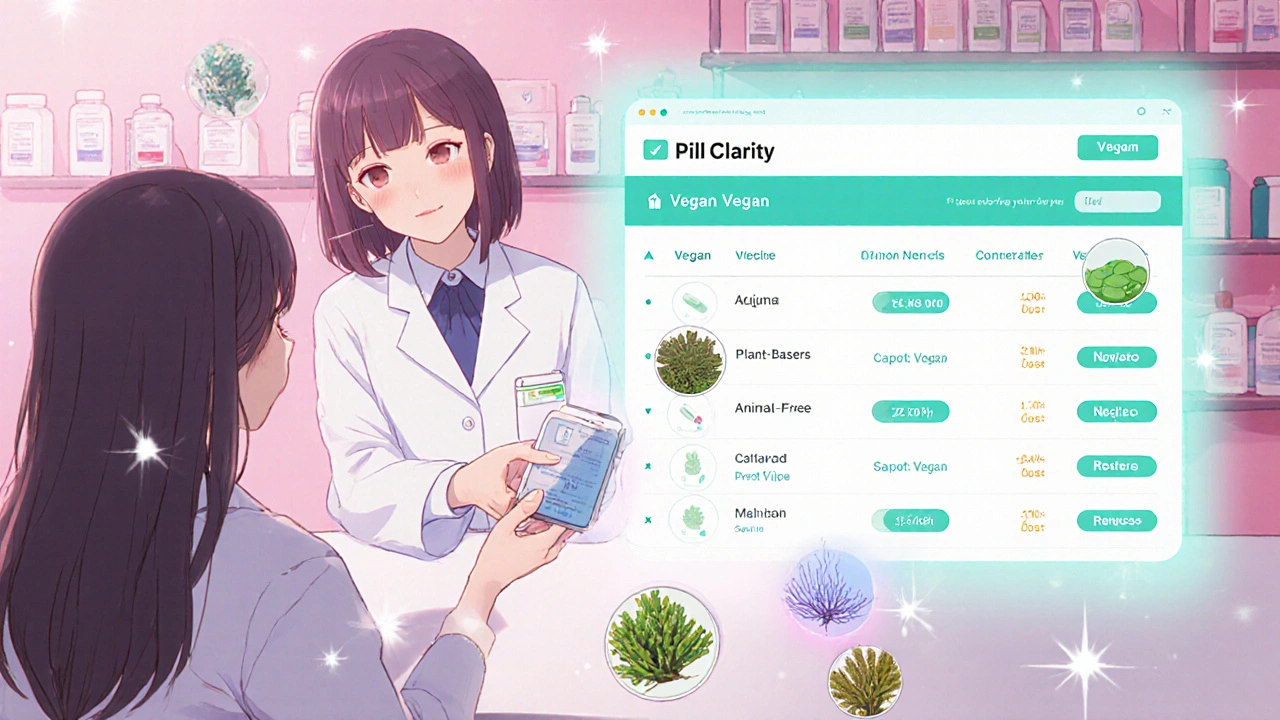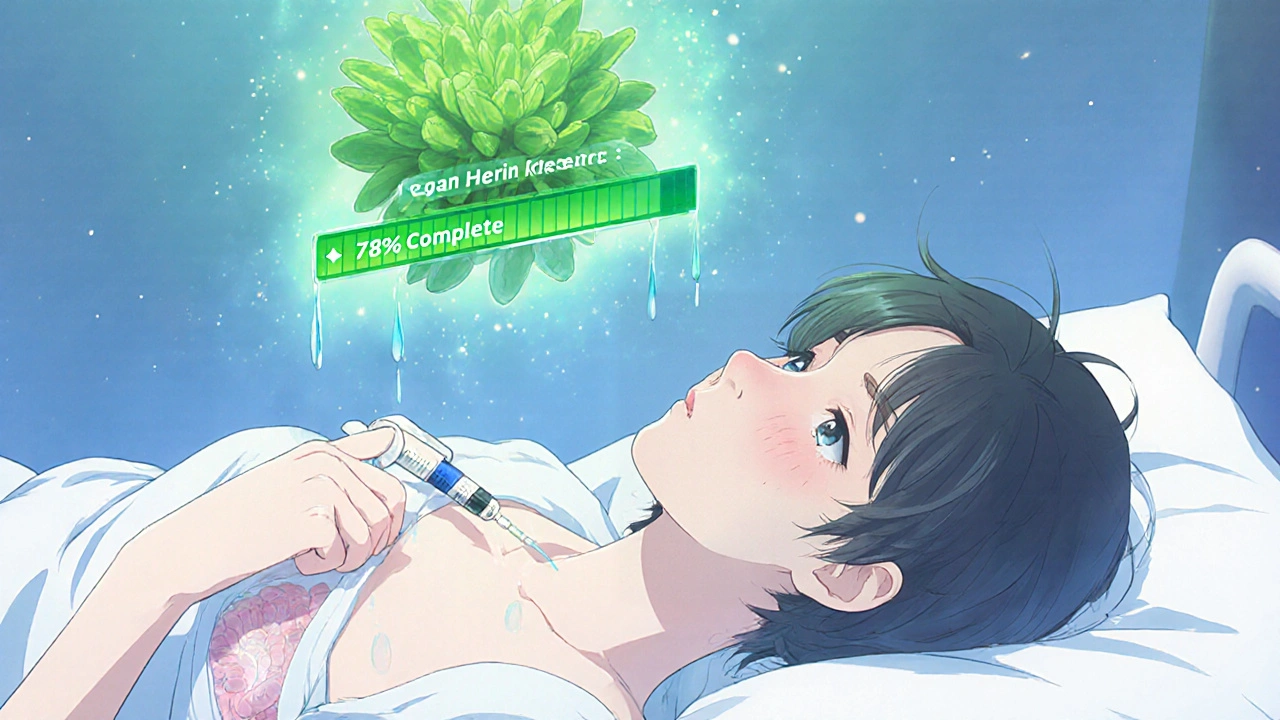Most people assume their medications are just chemicals in a pill-clean, neutral, and free of moral baggage. But for vegans and vegetarians, that’s not always true. Many common drugs contain hidden animal parts you won’t find listed as an active ingredient. These aren’t meat or dairy. They’re the leftovers: pig fat, sheep wool, cow bones, fish oil, even mare’s urine. And unless you ask, your pharmacist won’t tell you.
What’s Really in Your Pills?
The biggest offender? Gelatin. Around 90% of capsules-both soft gels and hard shells-are made from gelatin, which comes from boiling down the skin, bones, and tendons of pigs, cows, or chickens. If you’re swallowing a capsule, there’s a very good chance it’s made from animal parts. The same goes for many liquid medications and chewable tablets that use gelatin as a binder. Then there’s magnesium stearate, a common flow agent used to keep pills from sticking to machinery. About 65% of the time, it’s made from animal fat. You won’t see "pig fat" on the label. It’ll say "magnesium stearate (E470b)" or just "stearic acid (E570)"-both of which can come from slaughtered animals. The Viva Organization confirms this: stearic acid in medicine is often from cows, sheep, or pigs. Vitamin D3 is another surprise. Most supplements use lanolin, a waxy substance harvested from sheep’s wool. It’s processed into vitamin D3, but it’s still an animal product. Dr. Vegan’s research shows that plant-based D3 from green algae exists and is just as effective. The only difference? It’s vegan. And it’s not rare-many brands now offer it. But unless you read the fine print or ask, you’re probably getting the sheep-derived version. Other hidden ingredients include:- Glycerin (can come from animal fat or plant oils)
- Squalane (often from shark liver oil, though plant versions exist)
- Collagen (from fish, cows, or pigs-used in some supplements)
- Glucosamine and chondroitin (from shellfish or cow cartilage)
Medications That Are Hard to Replace
Some drugs aren’t just hiding animal parts-they’re made from them. These aren’t fillers. They’re the active ingredient. - Armour Thyroid is made from dried pig thyroid glands. If you have hypothyroidism, this might be your prescription. The synthetic alternative, levothyroxine, is vegan. But some people don’t respond well to it, and switching isn’t always easy. - Premarin, used for menopause, comes from the urine of pregnant mares. Synthetic estrogen alternatives exist, like estradiol, but they’re not identical. Many women report feeling worse on synthetics. - Heparin, a blood thinner, is extracted from pig intestines. There’s no vegan version. If you’re on heparin after surgery or for a clotting disorder, you’re using an animal product. No alternatives exist yet. - Creon and Viokace are pancreatic enzymes for people with cystic fibrosis or pancreatitis. They’re made from pig pancreas. No plant-based version works the same way. - Vascepa, used for high triglycerides, is made from fish oil. While plant-based omega-3s exist (from algae), they don’t contain the same EPA molecule in the same concentration. - Propofol, an anesthetic, contains egg phospholipids. If you’re allergic to eggs, this matters. If you’re vegan, it matters even more. There’s no vegan alternative approved for general use. These aren’t edge cases. These are life-saving drugs. For many, there’s no choice.What Can You Actually Do?
You don’t have to accept this silently. Here’s how to take control:- Ask your pharmacist. Don’t just say "I’m vegan." Say: "I need this medication without gelatin, magnesium stearate, lanolin, glycerin from animal sources, or any animal-derived ingredients." Pharmacists hear this more often now, and many have access to databases that flag animal ingredients.
- Check the Pill Clarity database. Formerly called VeganMed, this platform now verifies thousands of medications for animal-free status. You can search by drug name and see which versions are certified vegan. It’s free, and it’s updated regularly.
- Request tablet forms. Capsules are the worst. Tablets are more likely to be vegan. They don’t need gelatin shells. Ask if a tablet version is available.
- Look for plant-based Vitamin D3. Brands like Garden of Life, DEVA, and Nordic Naturals offer algae-based D3. Check the label for "D3 from lichen" or "algae-derived." Avoid "cholecalciferol from lanolin."
- Use PETA’s list. They have a downloadable A-Z guide of animal ingredients in medicine. Print it. Keep it in your wallet. Next time you get a new prescription, cross-check the inactive ingredients.

Why Isn’t This More Transparent?
Food labels in the U.S. and EU must list allergens and animal ingredients. Medicine doesn’t. The FDA doesn’t require disclosure of animal-derived inactive ingredients. Why? Because they’re considered "processing aids," not active components. So even if a pill contains pig fat, it doesn’t have to say so. The Transparent Label Campaign found that 50% of supplements contain hidden animal byproducts. Most consumers don’t know. And even if they do, they assume it’s unavoidable. But that’s changing. Pill Clarity was founded in 2021 and rebranded in 2023 to push for full transparency-not just for vegans, but for people with allergies, religious restrictions, or ethical concerns. The American Pharmacists Association is drafting new guidelines for 2024. More pharmacists are being trained to answer these questions.When You Have No Choice
Some people feel guilty. They’re on heparin. They’re on Armour Thyroid. They’re on propofol. They know it’s animal-based. They feel like they’re betraying their values. Here’s the truth: your health matters more than your pill’s origin. If a medication keeps you alive, it’s not a compromise-it’s survival. Vegans don’t have to be perfect. They have to be informed. If you’re on one of these medications, talk to your doctor. Ask: "Is there a non-animal alternative?" If the answer is no, ask: "Is there a way to monitor my health so I can switch if one becomes available?" You’re not failing. You’re navigating a broken system.
What’s Changing for the Better?
The vegan population in the U.S. is growing. About 3% of adults identify as vegan-around 10 million people. That’s not a niche anymore. It’s a market. And companies are starting to respond. - Plant-based D3 is now widely available in pharmacies and online. - Some manufacturers are switching from gelatin to hypromellose (a plant-based capsule). - Pharmacies in the UK, Canada, and parts of the U.S. now offer vegan-certified prescriptions on request. - The FDA has begun accepting applications for vegan alternatives to animal-derived drugs. Clinical trials for plant-based heparin are underway. The change isn’t fast. But it’s real.Final Thoughts: Knowledge Is Power
You don’t need to be a scientist to protect your values. You just need to ask the right questions. Most people swallow pills without thinking twice. Vegans and vegetarians have to think twice-every time. It’s not about being extreme. It’s about being aware. You have the right to know what’s in your medicine. You have the right to ask for alternatives. And you have the right to say no to animal products-even if they’re hidden in a capsule. Start today. Check your next prescription. Ask your pharmacist. Look up your vitamins. You might be surprised by what you find-and even more surprised by how much you can change.Are all capsules made from animal gelatin?
No. About 90% of capsules use gelatin from pigs, cows, or chickens, but many brands now use plant-based capsules made from hypromellose (HPMC). These are clearly labeled as "vegetarian" or "vegan." Always check the label or ask your pharmacist.
Is Vitamin D3 always from animals?
No. Most D3 comes from lanolin (sheep wool), but plant-based D3 from green algae is widely available and equally effective. Look for "D3 from algae" or "lichen-derived D3" on the label. Brands like DEVA, Garden of Life, and Nordic Naturals offer vegan options.
Can I get vegan heparin or Armour Thyroid?
No. Heparin is extracted from pig intestines, and Armour Thyroid is made from pig thyroid glands. There are no vegan alternatives that work the same way. If you need these medications, they’re medically necessary. Talk to your doctor about monitoring your health and staying informed about future alternatives.
How do I know if my medication has animal ingredients?
Check the inactive ingredients list on the bottle or leaflet. Look for gelatin, magnesium stearate, stearic acid, glycerin, lanolin, squalane, or glucosamine. If you’re unsure, call your pharmacist and ask: "Is this medication free from animal-derived ingredients?" Use the Pill Clarity database to search by drug name for verified vegan options.
Why don’t drug labels list animal ingredients?
The FDA doesn’t require disclosure of animal-derived inactive ingredients because they’re considered "processing aids," not active drugs. Unlike food, medicine isn’t regulated for ethical or dietary transparency. That’s why consumer advocacy groups like Pill Clarity and the Transparent Label Campaign are pushing for change.

Comments (12)
Summer Joy
November 20, 2025 AT 02:32
I just found out my vitamin D3 is from SHEEP WOOL??? 😱 I’ve been vegan for 5 years and this is the first time I’ve cried over a pill. I feel so betrayed. Like, I eat kale like it’s my job and this is what I get? 🤦♀️💔
daniel lopez
November 21, 2025 AT 07:16
This is a government cover-up. Big Pharma + the FDA are in bed with the pig and sheep industries. You think they want you to know your meds are made from dead animals? Nah. They want you docile. Look at the history of insulin - it used to be from pigs, now it’s synthetic. But they kept the animal crap in everything else. This is control. They don’t want you to have power over your body. #VeganConspiracy
Nosipho Mbambo
November 23, 2025 AT 01:40
I'm just... tired. I don't have time to check every pill. I have three jobs, two kids, and a cat who hates me. If my blood thinner is made from pig intestines... well, at least it's not my cat's intestines. 🤷♀️
Katie Magnus
November 23, 2025 AT 11:26
Ugh. So now I have to be a detective just to swallow a pill? Like, what’s next? Are my antidepressants made from whale sperm? 😒 I’m not a vegan martyr. I’m just trying to get through Monday.
King Over
November 24, 2025 AT 19:32
I always thought meds were just chemicals. Turns out they’re basically animal soup in a capsule. Wild. I’ll check my next prescription. Maybe I’ll just stop taking stuff. 🤷
Johannah Lavin
November 25, 2025 AT 17:26
I’m so glad this post exists. 🫶 I’ve been vegan for 8 years and never knew about lanolin in D3 or gelatin in capsules. I cried reading this. But also - you’re not alone. I started asking my pharmacist every time. She now keeps a list of vegan meds in the back. We’re building a quiet revolution. 💪🌱 And if you’re on heparin or Armour? You’re not failing. You’re surviving. And that’s enough.
Ravinder Singh
November 26, 2025 AT 22:08
Fellow vegan here from India - we’ve got this. In Mumbai, I found a clinic that stocks vegan capsules and algae-based D3. They even have plant-based glucosamine now. It’s not perfect, but change is happening. And yes, heparin is still a nightmare. But guess what? Clinical trials for recombinant heparin are in phase 2. We’re not waiting for permission to demand better. We’re just doing it. 🙌
Russ Bergeman
November 27, 2025 AT 18:15
Wait, so you’re telling me my birth control might have cow fat in it? 😳 I’m not even vegan and this is giving me anxiety. I need a pill that doesn’t come from a slaughterhouse. What even is this world?!
Dana Oralkhan
November 29, 2025 AT 04:09
To the person asking about birth control - I feel you. I looked into it and found that most oral contraceptives use magnesium stearate from animal sources. But there are vegan options! I switched to Norethindrone with plant-based fillers. It took three calls to three pharmacies, but I got it. You can too. It’s not easy, but it’s possible. You’re not weird for caring.
Jeremy Samuel
November 30, 2025 AT 11:57
I dont even know what stearate is. But I know pigs are dead. So maybe I should just eat a burger and be done with it.
Destiny Annamaria
December 1, 2025 AT 01:47
I’m from LA and I literally walked into a Whole Foods yesterday and asked for vegan meds. The pharmacist was like ‘Oh yeah, we’ve got a whole shelf for that.’ I didn’t even know they had one. I got vegan D3, vegan ibuprofen, and even vegan probiotics. It’s 2024. We’re not in the dark ages anymore. 🌱✨
Ron and Gill Day
December 2, 2025 AT 08:39
This post is ridiculous. You’re making a mountain out of a molehill. People are dying because they refuse to take life-saving meds because they’re ‘not vegan enough.’ You’re not a hero. You’re a liability. Get over yourself.